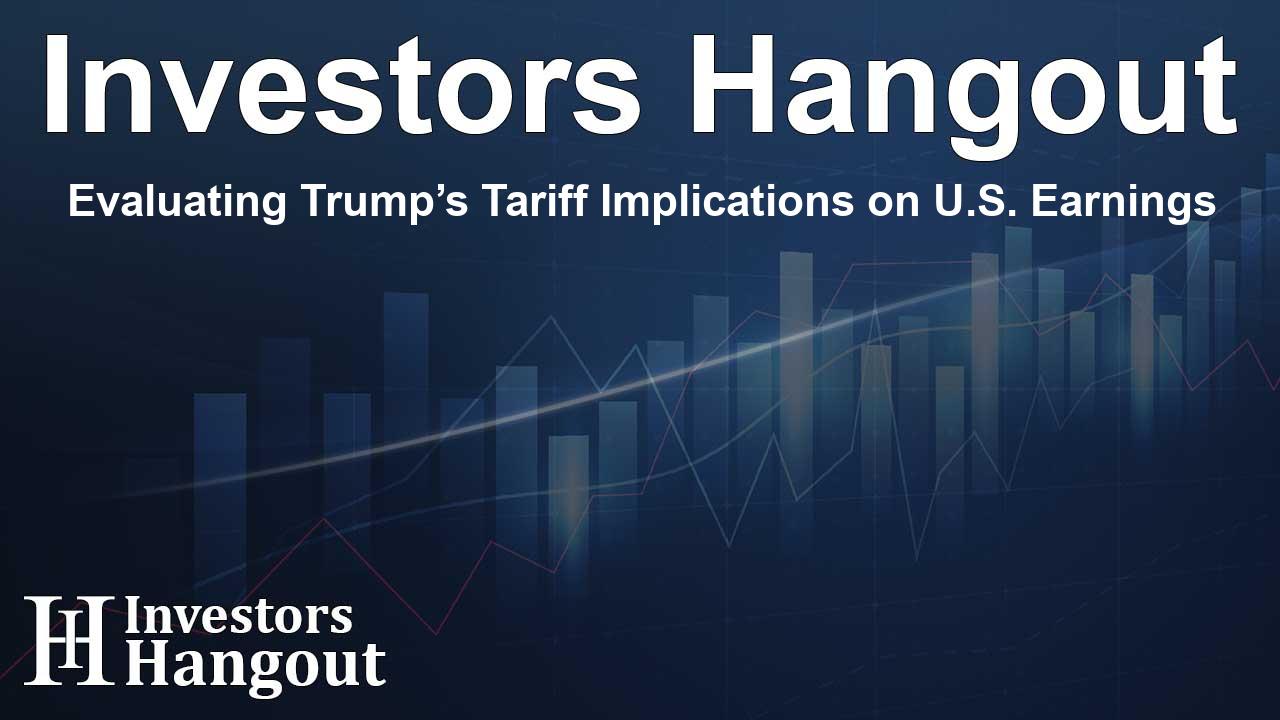Evaluating Trump’s Tariff Implications on U.S. Earnings

The Effects of Proposed Tariffs on U.S. Earnings
Donald Trump's plan to introduce significant tariffs on imports could have a notable impact on U.S. earnings. Recent research by Barclays reveals that if Trump is elected and implements these tariffs, earnings for the S&P 500 could fall by as much as 4.7% next year.
The Mechanism Behind Tariffs and Their Effects
This policy is part of Trump's larger strategy to tax imports, aimed at protecting American manufacturing and stimulating domestic economic growth. He has argued that for too long, other nations have benefited from U.S. resources without contributing fairly. His proposals include a blanket 10% tariff and even higher tariffs on certain products from countries like China, which could lead to significant shifts in market behavior.
Sector-Specific Impacts
Barclays has pinpointed five sectors that would face considerable risks if these tariffs come into effect: materials, discretionary, industrials, technology, and healthcare. Each sector has different levels of exposure to tariff-related challenges. For example, discretionary stocks are predicted to experience the largest impact, with a potential earnings drop of around 10% directly resulting from the proposed import tariffs.
Retaliation and Supply Chain Changes
Moreover, companies in the materials sector may see earnings decline by about 8%, in response to retaliatory tariffs imposed by other nations. This situation adds a layer of complexity to foreign relations and overall economic stability. U.S. businesses might need to adjust their supply chains or pass on increased costs to consumers, which could affect profit margins and eventually raise consumer prices across various goods.
Market Reactions and Economic Implications
The market is watching these developments closely, especially as political conditions are influencing economic policies. According to Barclays analysts, if Trump goes ahead with the tariffs and other countries retaliate, the S&P 500 could initially see a drop of 3.2% in earnings, followed by an additional 1.5% loss from retaliatory measures.
Additionally, inflation could rise by 0.09 percentage points shortly after the tariffs are enacted, potentially leading to a GDP contraction of 1.2% within the first year. These elements highlight the tangible economic risks tied to the upcoming election and its potential consequences.
Economic Forecasts Amid Political Turmoil
With uncertainty surrounding the economic outlook, the presidential election is often compared to a coin toss, especially between Trump and his Democratic challenger. The stakes extend beyond trade strategies; they encompass broader effects on the economy, investment opportunities, and even how consumers behave. Trump's intention to enforce these tariffs suggests a more isolationist stance that some sectors may embrace while others may find it off-putting.
Examining the Long-Term Effects
While the immediate consequences of proposed tariffs may appear minor in terms of corporate earnings, the long-term ramifications could introduce persistent challenges. Increased costs and slower economic growth might exert significant pressure, affecting market sentiment and establishing precedents for future economic policies.
Frequently Asked Questions
What are the potential impacts of Trump's tariffs on earnings?
Barclays estimates that the proposed tariffs could decrease S&P 500 earnings by up to 4.7% next year, with certain sectors being more vulnerable than others.
Which sectors are most vulnerable to Trump’s tariff proposals?
The sectors facing the greatest risks include materials, discretionary, industrials, technology, and healthcare, with discretionary stocks expected to endure the most harm.
How might companies react to the imposition of tariffs?
Firms may decide to alter their supply chains, raise prices for consumers, or absorb increased costs to maintain their competitive edge, all of which could influence profit margins.
What economic consequences could arise from these tariffs?
Short-term inflation may increase by 0.09 percentage points, and the U.S. GDP could decline by 1.2% in the first year after implementation, as per Barclays predictions.
What insights can we expect from market analysts regarding these tariffs?
Analysts forecast downgrades in earnings for various industries and will keep a close eye on retaliatory measures from other countries and their impact.
About The Author
Contact Thomas Cooper privately here. Or send an email with ATTN: Thomas Cooper as the subject to contact@investorshangout.com.
About Investors Hangout
Investors Hangout is a leading online stock forum for financial discussion and learning, offering a wide range of free tools and resources. It draws in traders of all levels, who exchange market knowledge, investigate trading tactics, and keep an eye on industry developments in real time. Featuring financial articles, stock message boards, quotes, charts, company profiles, and live news updates. Through cooperative learning and a wealth of informational resources, it helps users from novices creating their first portfolios to experts honing their techniques. Join Investors Hangout today: https://investorshangout.com/
The content of this article is based on factual, publicly available information and does not represent legal, financial, or investment advice. Investors Hangout does not offer financial advice, and the author is not a licensed financial advisor. Consult a qualified advisor before making any financial or investment decisions based on this article. This article should not be considered advice to purchase, sell, or hold any securities or other investments. If any of the material provided here is inaccurate, please contact us for corrections.
